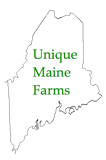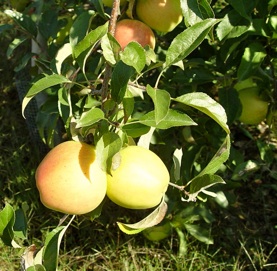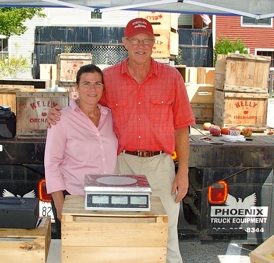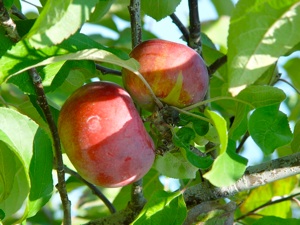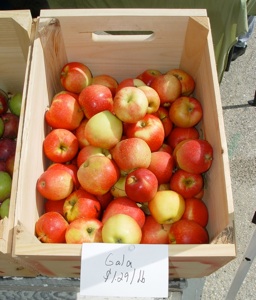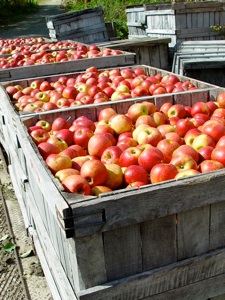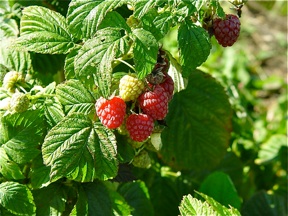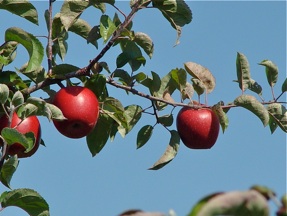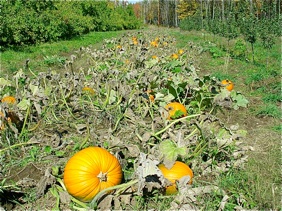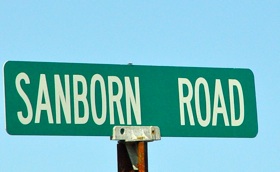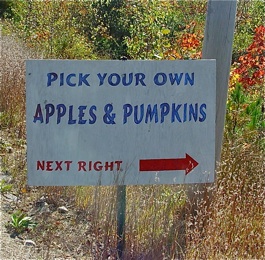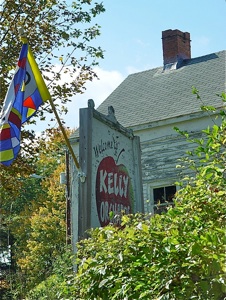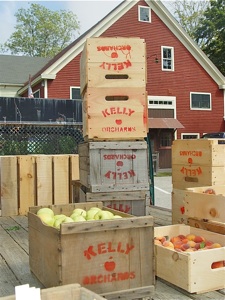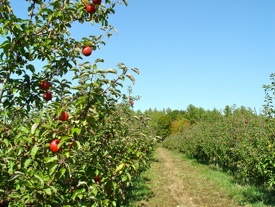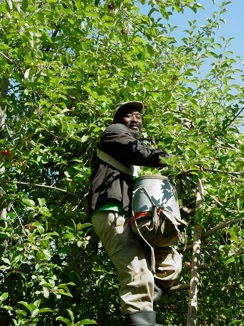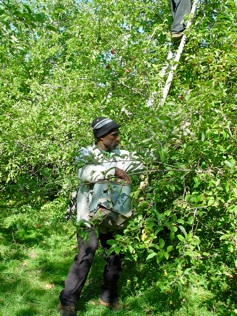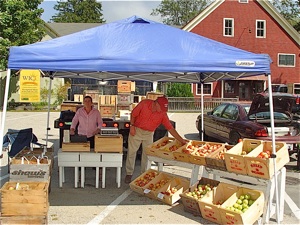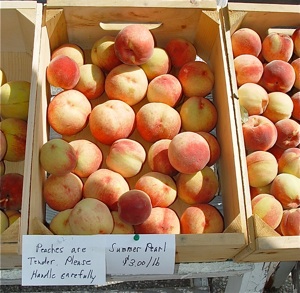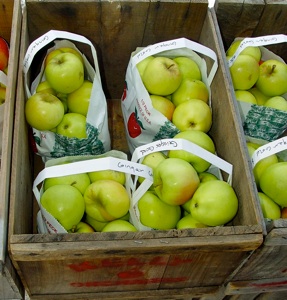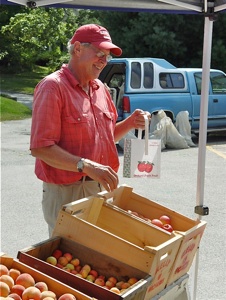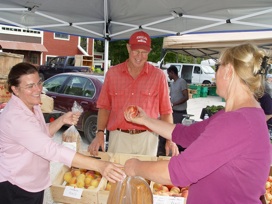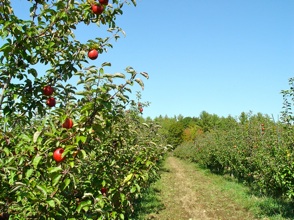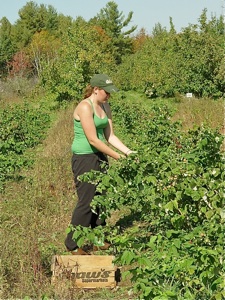Name: Kelly Orchards
Address: Art and Jill Kelly
82 Sanborn Road
Acton, Maine 04001
Phone: 207-636-1601
Website: www.kellyorchards.com
Email: kellyorchards@gmail.com
Hours: 9 a.m. to 5 p.m.
daily in season
Products and Services:
-pick your own apples
-pick your own blueberries, raspberries
-pick your own pumpkins
-Kennebunk Farmers’ Market
-North Berwick Farmers’ Market
-peaches
-apples ( 17 varieties)
-fall squash
-cider
What Makes Kelly Orchards Unique?
In the early part of the twentieth century many Mainers living in the rural areas were quite self-sufficient. Just about everyone residing in the country tended some apple trees on their farm. To maintain apple trees properly so that they remain healthy and productive requires some time and skills. As the years went by and more people depended on stores and supermarkets for their source of food, many orchards were abandoned or neglected.
According to Gary Keough, the State Statistician with the USDA National Agricultural Statistics Office, in 1925, when the number of Maine farms were first recorded, there were 35, 561 farms that were raising apples. Eighty-two years later in 2007, in the most recent agricultural census that was taken in Maine, only 372 apple farms were reported in Maine. These remaining apple farms had a total of 2,658 acres of bearing trees and 336 acres of non-bearing trees. Like the dairy industry in Maine, many apple farmers are facing considerable challenges.
Art Kelly is one of the Maine farmers that is still relying on raising apples on a commercial basis for a livelihood. He has owned Kelly Orchards in Acton, Maine, since 1982. He has witnessed many changes in apple farming and has overcome some difficult times. He was invited to participate in this project to share information about some of the challenges that go hand in hand with making a living while operating a mid-size apple farm.
Art graduated from Gettysburg College with a degree in Economics. He also earned a degree in Plant Science with a specialty in apple growing from the University of Massachusetts. In 1978, he became manager of Lovejoy Orchards in Acton. Four years later he purchased the orchard. He served as President of the Maine Pomological Society and he has attempted to remain up-to-date about the new methods and trends in apple farming.
When asked about some of the major challenges
that Art has faced in keeping the farm viable, his
immediate response was procuring available and affordable labor. Even before Art took over the
farm operation, workers from Jamaica were traveling to Acton each fall to help with the apple harvest. When Unique Maine Farms visited Kelly Orchards in October of 2012, there were four men from Jamaica who were working at the Kelly farm.
Art usually hires four to five high school students to work through the summer at his orchard. They help out with various tasks such as picking blueberries or tending to the peaches. Art felt fortunate to be able to also find and hire three other local workers who helped out on the farm and assisted at the farmers’ markets this past year.
Finding experienced apple pickers who are willing to work each day for long hours in all types of weather in a job that requires a great deal of agility and stamina is not an easy task. The apple buckets that are carried by the apple picker can weigh forty pounds. It is very exhausting to spend an entire day continuously navigating up and down a twenty-foot ladder while carrying a heavy bucket of apples. A good apple picker can pick seventy-five to one hundred bushels a day!
The four Jamaicans (who obtain a guest visa through the federally sanctioned H-2A temporary agricultural program) return each year to Kelly Orchards. Art discussed how there is a great deal of paperwork and several deadlines to meet to make sure that this will materialize. Some of the Jamaican workers have been working at Kelly Orchards for over thirty years! They have proven to be hard-working and dependable. Art explained that many of the Jamaicans are interested in working in the Maine orchards because the pay for the three-month visit is actually significantly higher than anything that can be earned in Jamaica for an entire year. For many it is a way that they can save money so that their children can attend school.
In Jamaica, parents must pay for their children’s education after the completion of grade 6. Finding the money for the school fees, books, and transportation is out of the question for many Jamaicans. In a International Monetary Fund report that was published in October 2011, Jamaica was ranked as scoring the highest in poverty, unemployment, and inequality of all the countries in the Americas.
Art has developed a good relationship with the
apple pickers from Jamaica. They call him during the winter to make sure that they will be welcome to return. Accommodations at the farmhouse at the orchard are provided for them. A van is accessible that they are allowed to use to get to the stores or to travel about.
John Young of the New England Apple Council
kindly spent a great deal of time discussing the
history and the role of the several hundred Jamaican workers who help out with the apple industry in Maine. The information that he shared and some of the heartwarming stories that he relayed has encouraged Unique Maine Farms to consider creating a separate profile in the future for this project on the statewide contributions of Jamaicans to Maine farming.
While the Jamaican workers at Kelly Orchards are tending the apples and the other crops, Art and his wife, Jill, and one of their assistants, head out to the local farmers markets with their apples, peaches, blueberries, raspberries, pumpkins, cider, and fall squash during the summer and fall. Kelly Orchards can be found at the Springvale Farmers‘ Market on Wednesdays from 1 to 5 p.m. On Friday afternoons, from 3 to 6 p.m., they head over to the North Berwick Farmers’ Market. Saturday involves selling their produce at two markets -the Kennebunk Farmers Market and the Sanford Farmers’ Market.
The Kellys grow seventeen varieties of apples
on their thirty-acre farm including Jerseymac, Paula Red, Sunrise, Ginger Gold, Zestar, McIntosh, Honeycrisp, Gala, Cortland, Macoun, Jonagold, Red Delicious, Mustu/Crispin, Spencer, Northern Spy, Lady Apples, and Golden Delicious. Some of the varieties that Kelly Orchards carries were chosen because of their time of harvest. Some are ready to be picked in mid-August while the optimum time for others to be harvested will occur as late as November. Other varieties were chosen to be grown because of their sweetness or their exceptional juicy qualities. Different apples are prized for different uses such as baking, making applesauce, or putting up jelly.
Dr. Renae Moran, the Extension Tree Fruit Specialist at the University of Maine Cooperative Extension, has been conducting a test of the new variety of apple called SnowSweet in three parts of Maine. She has planted several trees at Kelly Orchards and at PieTree Orchard in Sweden and at Circle B Farms in Caribou. SnowSweet is a winter hardy apple that ripens in early October with a sweet flavor not found in most New England apple varieties. The project also involves a pre-plant fertilizer with a micronutrient and an inoculation of the roots at planting with mycorrhizae. Since apple trees are cultivated for decades, this project will continue for a number of years. Each site has at least twenty trees and PieTree has a set of trees that is being managed organically.
Around ten thousand trees are growing at Kelly Orchards. Approximately six hundred new trees are planted each year. Some additional apple varieties have been introduced to the orchard, but they have not yet reached maturity for picking. These varieties include Cox Orange Pippin, Bramley Seedling, Ashmead Kernel, Golden Russet, and Esopus Spitzenburg.
Another major challenge for Kelly Orchards after securing a dependable labor force to pick the apples, according to Art, is dealing with the insects and disease that can decimate any orchard if it is not receiving proper care. Kelly Orchards uses Integrated Pest Management.
Integrated Pest Management (IPM) uses cultural practices, and natural predators and pesticides to control pests and diseases with as little impact on the environment as possible. Art monitors pest presence in the orchard by scouting, using pest specific traps, weather conditions, and degree-day models to predict pest-in migration.
Cultural practices and careful selection of pesticides are incorporated to promote natural controls and predators of pests. Sprays are timed so that they are only applied when pests are present and have reached damaging levels. Selective pesticides are used rather than broad-spectrum pesticides with low toxicity to non-target organisms so there is minimal impact on the environment.
The Kellys have a pick-your-own operation for
their apples, pumpkins, berries, and squash. A small building will be erected for the 2013 season where visitors to the orchard can purchase ready-picked apples. Kelly Orchards offers gift boxes with a selection of apples that can be shipped during the apple season.
In addition to the pick-you-own operation, Kelly Orchards sells a large amount of apples on a wholesale basis to Ricker Hill Orchard in Turner. Many of the apples end up in the Hannaford Supermarkets. Art has found, like so many other orchards, that he has needed to diversify to stay afloat. When he purchased the orchard in 1982, only apples were being sold. The Kellys have added peaches (approximately fourteen varieties), raspberries, blueberries, pumpkins, and fall squash to the farm’s offerings.
In the discussion of challenges for apple farmers, Art was questioned about how weather plays a significant role. He immediately laughed, and responded, “There is nothing that I can do about the weather so I try not to think about it. I have tried to diversify and grow varieties that can be spread out throughout the season.” As many Mainers know, the 2012 fall season proved to be a total loss for certain areas in the state where the apple trees started budding out after unusually warm March weather only to be wiped out by a return to freezing temperatures in April. Kelly Orchards was spared from the devastation, but like any experienced apple farmer, Art is well aware that other challenges and surprises often are on the horizon.
Dr. Moran commented that some apple farmers are turning to the production of stone fruits such as cherries, peaches, and plums. John Young discussed how climate change has enabled more
successful peach production in areas where it
previously would not have been considered.
Of great concern to many farmers is the Asian fruit fly, the spotted wing Drosophila, which initiates attacks on mature fruit and lays eggs which cause spoilage. Farmers growing soft fruits such as high bush blueberries, peaches, and raspberries are all very concerned.
Unique Maine Farms could initiate several other discussions of the many other challenges that crop up on an apple farm. Deer, moose, bear, and porcupines often wreak havoc in an orchard and rodents can cause destruction to the base of the apple trees. Luckily, the fencing and the scent of their dog at Kelly Orchards has deterred many four-legged visitors and Art explained by mowing the orchard floor regularly he has kept the mice and voles and weeds at bay.
Even though quite a bit has been discussed about all the challenges of operating an apple farm, there are certainly many wonderful benefits. It is fitting to end this profile on a positive note. Art and Jill Kelly have been successful in operating a family-run apple farm that is producing quality apples, berries, pumpkins, and squash. This is
very heartening when one considers all the apple farms that have disappeared.
Kelly Orchards has become recognized as an established source of healthy local food. They seemed to have mastered growing peaches - something not easily accomplished in Maine. Their produce is being purchased locally at four farmers markets in southern Maine, and their apples are being carried by a large Maine supermarket chain. Through their hard work and the efforts of some local workers and four workers from Jamaica, many Mainers are having the opportunity to literally and figuratively enjoy the many fruits of their labor.


